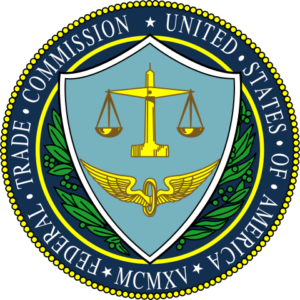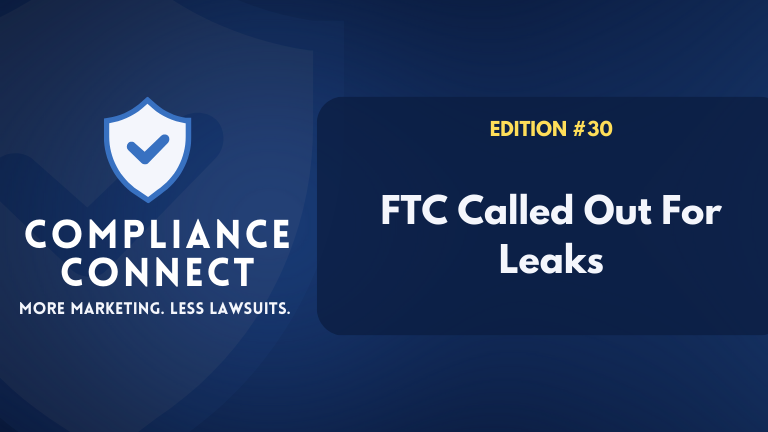Good morning! This is the thirtieth edition of the Compliance Connect newsletter.
The goal is simple: to keep you in the loop on what the FTC and other regulatory agencies are up to so that you can protect yourself.
These newsletters will land in your inbox twice a week – Mondays and Thursdays.
Remember: this is NOT legal advice, only information!
Here’s the rundown today…
- 💧 Inspector General Claims FTC Has A Leaking Problem
- 🧀 Kraft Sued For Deceptive Marketing
- 💼 Case Where The FTC Went After An Advertising Agency
- 📉 The Surprising Decline In FTC Refunds
- 📊 How To Talk About Your Own Results Compliantly
Compliance Digest: What You Should Read Today
FTC Called Out For Leaks To The Press
According to a recent inspector general report, the FTC has experienced a steady rise in unauthorized disclosures of nonpublic information (NPI) to the media.
This includes confidential business data, investigative findings, or sensitive consumer information.
These unauthorized disclosures are taken serious. Anyone caught leaking sensitive information could be fired, face up to a year in prison, and even get sued.
According to the report, evidence suggests that many leaks may originate from within the agency.
These breaches erode trust among businesses, consumers, and other stakeholders. They undermine the FTC’s credibility and its ability to enforce the law effectively.
According to the report, the FTC is trying to counter this with regular training and enhanced security protocols.
No Artificial Preservatives? Kraft Faces False Advertising Lawsuit
Kraft Heinz is facing a class action lawsuit over claims that its iconic Mac & Cheese packaging falsely advertises “No Artificial Flavors, Preservatives, or Dyes.”
Plaintiffs allege the product contains synthetic citric acid and sodium phosphates, which they claim function as preservatives.
Kraft Heinz DENIES the allegations, stating its product does not contain artificial preservatives and the lawsuit lacks merit.
The lawsuit seeks damages for fraud, unjust enrichment, and violations of STATE consumer protection laws.
This lawsuit follows a trend of false advertising cases in the food industry, including previous suits against Velveeta and Fireball.
It’s a reminder that state laws and class action lawsuits are just as threatening as the FTC.

Case Breakdown: Nissan
Back in 2014, the FTC filed an administrative case against Nissan and TBWA.
Summary Of The Case
The complaint focused on misleading ads involving the Nissan Frontier pickup truck.
The ad, called “Hill Climb,” depicted the truck pushing a dune buggy up a steep sand hill, presented as a real-life event filmed with a phone.
Here is a link to download the ad
The ad included a brief, hard-to-read disclaimer stating it was fictionalized.
The FTC alleged that Nissan and TBWA represented the ad as an accurate depiction of the truck’s abilities, which was false.
In reality, cables were used to pull the vehicles, and the hill was less steep than portrayed. The truck could NOT perform the feat shown.
These actions were deemed deceptive and in violation of Section 5(a) of the FTC Act, which prohibits unfair or deceptive practices.
TBWA, as the agency that created and distributed the ad, was also accused of knowingly making false claims.
Key Takeaways
Here are 3 key takeaways that ANY business or marketer can get from this case…
#1 – Clear and Prominent Disclaimers
The presence of a disclaimer is not enough by itself. They must be clear, legible, and displayed PROMINENTLY.
#2 – Agencies CAN Be Held Responsible
Advertising agencies can be held accountable for deceptive practices, especially if they knew or should have known that their representations were false or misleading.
#3 – Net Impression Is Everything
Advertisements are evaluated based on how a reasonable consumer interprets the message.
Misleading implications, even without outright false statements, can violate the law.
Did You Know…
The amount of money returned to consumers as a result of FTC cases has dropped from $403.4 million in 2021 to $292.1 million in 2023. This is mainly due to the limitations placed on the FTC by the AMG Capital case.

Quick Compliance Tip: Stories About Yourself
When you’re selling something, you need CREDIBILITY. A great way to build credibility is to share your own results.
However, if you don’t do it right then you can create a FALSE net impression and even an implied earnings claim.
Here are 3 important rules to keep in mind in order to share your own results in a compliant fashion.
Rule #1 – They must be FULLY substantiated
Not kind of. Not close. Fully.
This means you need to be able to prove to a third party without a shadow of doubt that you actually have the results you’re making claims on.
The proof also needs to be recent and inarguable.
Rule #2 – They need to be followed with CONTEXT
You have to disclose and disclaim tremendously clearly that the only reason you’re sharing your own results is for credibility and not by any means implying that your results will be theirs.
For example, you might say, “My results are not typical. I have 20 years of experience and a great team. I’m not saying you’ll get the same results – just that I have credibility here.”
Rule #3 – Don’t Overdo It
If you want to share your own huge results…
- Do it once or twice.
- Don’t lean on it.
- Don’t keep coming back to it.
If you do, you’re risking creating the wrong net impression, and then suddenly, even substantiated results are non-compliant.
